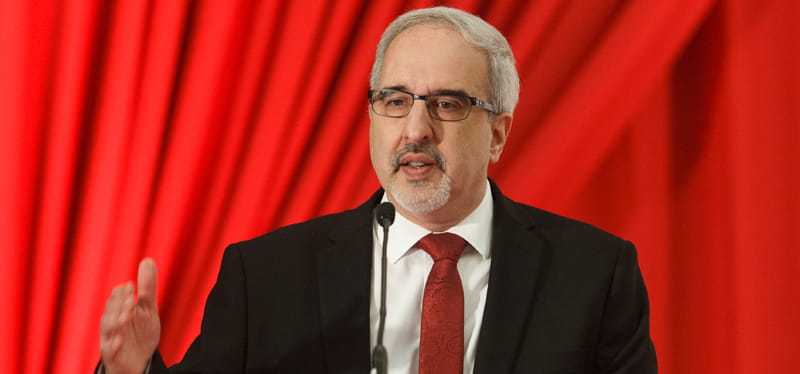AHA Physician of the Year passionate about bystander CPR
By American Heart Association News

With his affable demeanor and easy smile, it’s hard to imagine ruffling Dr. Robert Sanchez.
But there’s one thing that provokes his ire every time.
“When I hear the statistics of people who suffer a cardiac arrest and don’t receive CPR, it’s upsetting,” said Sanchez, a cardiologist at The Heart Institute in St. Petersburg, Florida, and director of cardiovascular medicine at HCA West Florida’s Northside Hospital. “When I get a call to respond to the ER to care for a patient who has suffered a cardiac arrest and I ask if there was bystander CPR performed, and I hear ‘no,’ I know I’m already behind the eight ball. It doesn’t matter how much fancy equipment we have if we’re not able to do step 1: effective CPR.”
Sanchez, who last month was honored as the American Heart Association Physician of the Year, traces his emotional response back to his childhood, when cardiovascular disease claimed his grandfather, who died from a sudden cardiac arrest.
“It was devastating for my family,” said Sanchez, who received the annual award for a practicing physician who has rendered outstanding contributions to the AHA's mission to build healthier lives, free of cardiovascular diseases and stroke. “Since childhood, I dreamed of being a doctor so I could take care of patients who suffered heart attacks and help prevent sudden cardiac death.”
More than a decade ago, his passion and career path landed on common ground.
“I was asked to speak on behalf of the American Heart Association in the St. Petersburg area,” Sanchez said. “After meeting and working with other volunteers and staff and better understanding the mission of the American Heart Association, it became clear to me that I had met my professional soulmate.”
His relationship with the AHA includes being a member and past president of the Tampa Bay Metro Board and incoming president of the Greater Southeast Affiliate Board. He’s currently on the Science Advisory and Coordinating Committee and the national Volunteer Oversight Committee.
“Volunteering for the American Heart Association has been career- and life-changing,” Sanchez said.
His exemplary achievements include advocating for all Tampa Bay school districts to make CPR training a graduation requirement.
“Approximately 25,000 new lifesavers are graduating from our community schools annually,” he said.
Sanchez served as co-chair of the Tampa Bay Mission: Lifeline STEMI Systems Accelerator demonstration project. As part of the STEMI Systems Accelerator project the Tampa Bay leadership team worked to organize STEMI care throughout the Tampa Bay region. By changing the focus to first medical contact-to-device time and coordinating treatment protocols they were able to increase significantly the proportion of patients treated within guideline goals.
In mid-2015, the AHA Tampa Bay Metro Board set an ambitious goal to train 150,000 people in Hands-Only CPR by the end of 2017. By the end of December 2017, that goal was exceeded, with more than 220,000 community members trained.
“I was privileged to direct that project — it was an amazing partnership between the Tampa Bay Metro Board and local fire and rescue,” he said. “Everyone realized it was a very lofty goal, but they all believed in the mission. We will never know the full impact of these efforts or the names of all the individuals saved; however, I am confident many people will be spared the pain of losing a loved one.”
As he reflects, Sanchez marvels at his volunteer experiences with the AHA.
“I’m pretty shy and introverted,” he said. “I was just sitting in my office one day minding my own business, and the AHA communications director was here talking to my partner about public speaking. Then, someone asked, ‘How about Dr. Sanchez?’ And here I am.”
If you have questions or comments about this story, please email [email protected].





